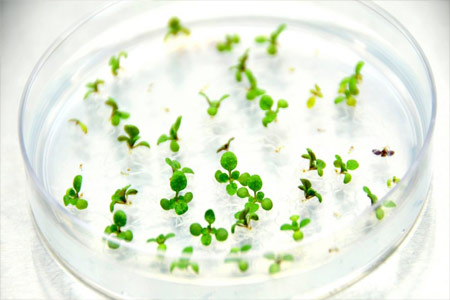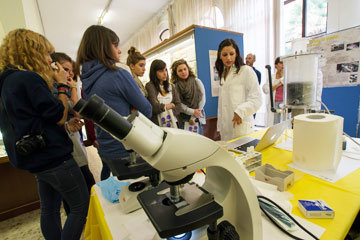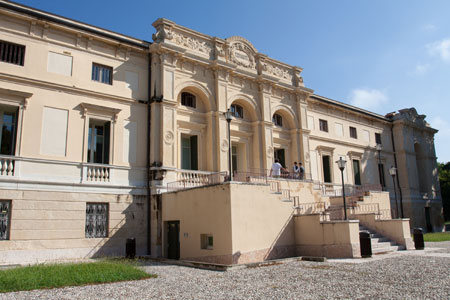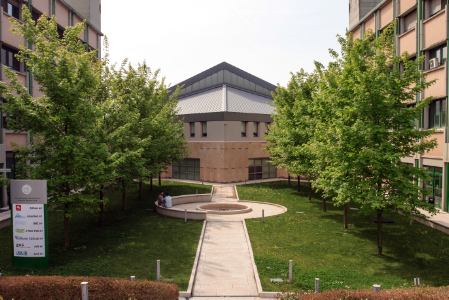Obiettivi formativi
Modulo: Teoria
-------
Il corso si pone come obiettivi l'acquisizione dei concetti fondamentali della Chimica Generale e di alcune delle nozioni fondamentali di Chimica Inorganica e di Chimica Fisica.
Saranno trattati i seguenti argomenti:
Fenomeni chimici e fisici. Le leggi fondamentali della Chimica. Struttura atomica della materia. Proprietà periodiche. Reazioni chimiche. Stechiometria. Gas, solidi, liquidi. Il legame chimico. Termochimica e termodinamica. Diagrammi di stato e proprietà delle soluzioni. Cinetica chimica. Equilibrio chimico. Equilibri in soluzioni acquose. Elettrochimica.
Modulo: Laboratorio
-------
Il corso si pone come obiettivi l'acquisizione dei concetti fondamentali della Chimica Generale.
Fenomeni chimici e fisici. Le leggi fondamentali della Chimica. Struttura atomica della materia. Proprietà periodiche. Reazioni chimiche. Stechiometria. Gas, solidi, liquidi. Il legame chimico. Termochimica e termodinamica. Diagrammi di stato e proprietà delle soluzioni. Cinetica chimica. Equilibrio chimico. Equilibri in soluzioni acquose. Elettrochimica.
Le esercitazioni numeriche e di laboratorio di Chimica Generale ed Inorganica completano e integrano il bagaglio culturale dello studente formatosi nella parte teorica del Corso. In particolare, gli obiettivi formativi si propongono di preparare lo studente alla risoluzione di problemi reali di interesse chimico. Vengono inoltre fornite allo studente le nozioni di base sulle comuni attrezzature di un laboratorio chimico e la manualità di lavoro in regime di sicurezza.
Programma
Modulo: Teoria
-------
- Introduzione, proprietà, misure e unità di misura
- Elementi, atomi e composti
- Nomenclatura dei composti inorganici
- Tipi di reazioni: precipitazione, acido-base, ossidoriduzione
- Principi generali della stechiometria
- Leggi dei gas
- Termochimica: energia interna, entalpia, entalpie di reazione
- Struttura dell’atomo; modello di Bohr, meccanica quantistica
- Proprietà periodiche: raggi atomici e ionici, energia di ionizzazione, affinità elettronica, elettronegatività
- Legame covalente
- Polarità dei legami
- Forma delle molecole: teoria VSEPR
- Ibridazione
- Forze di Van der Waals
- Generalità e proprietà dei liquidi
- Generalità e proprietà dei solidi
- Soluzioni; modi di esprimere le concentrazioni
- Proprietà colligative
- Cinetica chimica; meccanismi di reazione
- Equilibrio chimico
- Equilibri acido-base; soluzioni di acidi, basi, sali; soluzioni tampone
- Equilibri di solubilità e di complessazione
- Spontaneità delle reazioni chimiche; energia libera
- Pile e celle elettrochimiche
- Elettrolisi
- Chimica nucleare e radiochimica
Modulo: Laboratorio
-------
Modulo: Teoria
-------
- Introduzione, proprietà, misure e unità di misura
- Elementi, atomi e composti
- Nomenclatura dei composti inorganici (1 ora)
- Tipi di reazioni: precipitazione, acido-base, ossidoriduzione
- Principi generali della stechiometria
- Leggi dei gas
- Termochimica: energia interna, entalpia, entalpie di reazione
- Struttura dell’atomo; modello di Bohr, meccanica quantistica
- Proprietà periodiche: raggi atomici e ionici, energia di ionizzazione, affinità elettronica, elettronegatività
- Legame covalente
- Polarità dei legami
- Forma delle molecole: teoria VSEPR
- Ibridazione
- Forze di Van der Waals
- Generalità e proprietà dei liquidi
- Generalità e proprietà dei solidi
- Soluzioni; modi di esprimere le concentrazioni
- Proprietà colligative
- Cinetica chimica; meccanismi di reazione
- Equilibrio chimico
- Equilibri acido-base; soluzioni di acidi, basi, sali; soluzioni tampone
- Equilibri di solubilità e di complessazione
- Spontaneità delle reazioni chimiche; energia libera
- Pile e celle elettrochimiche
- Elettrolisi
- Chimica nucleare e radiochimica
Modulo: Laboratorio
-------
5 esperienze di Chimica Generale
Modulo: Esercitazione
-------
Esercizi di Stechiometria
Modalità d'esame
Modulo: Teoria
-------
L'esame consiste in una prova scritta, comprendente esercizi di stechiometria e domande sull'intero programma del Corso, e una prova orale.
Modulo: Laboratorio
-------
L'esame consiste in una prova scritta, comprendente esercizi di stechiometria e domande sull'intero programma del Corso.







